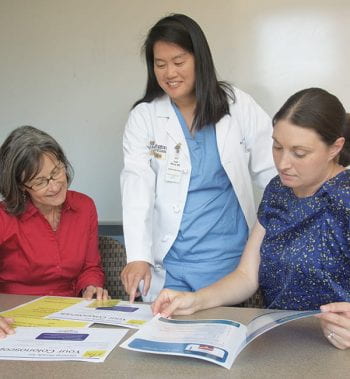Web-based Tool Aids Insurance Selection

The Affordable Care Act (ACA) has improved access to health insurance, an important first step to improving health outcomes. But even those familiar with health-insurance concepts and terms can struggle with the complexity of selecting a plan. For people purchasing health insurance in the ACA marketplace — many with limited health-insurance literacy and no experience as insurance consumers — the choices are even more daunting.
“When insurance information is confusing, people often just default to the lowest-cost monthly plan,” says Mary Politi, PhD, a Division of Public Health Sciences researcher. “But that doesn’t necessarily lead to the best choice for people with chronic health needs.”
Politi, a clinical psychologist, led one of the earliest studies examining difficulties for uninsured people planning to register for health-care coverage under the ACA. Those difficulties included a lack of understanding of terms used to compare health plans.*
Politi and her coworkers have since developed a web-based health insurance decision support tool called Show Me My Health Plans. The tool provides health insurance education using plain language and graphics, and applies the participant’s age, gender and health information to calculate personalized yearly cost estimates for plans available within a 90-mile radius of St. Louis. The tool displays three plans that might be a good fit, taking into account cost, coverage and the individual’s stated preferences. It also calculates a person’s health-care expenditures based on national estimates of health care usage at a given age, gender and across many health conditions
In a study of 362 people,** participants who used the tool were more knowledgeable, more confident in their choices, and more likely to select silver plans than bronze plans compared to those who used the government website. “Silver plans have slightly higher monthly premiums but lower deductibles and out-of-pocket maximum costs,” says Politi. “They are perceived as a better value than bronze plans for individuals needing to use health care.” Politi is working on ways to disseminate the tool to others in the region and throughout Missouri.
*Study funded by the Agency for Healthcare Research and Quality, grant number R21HS020309
**Study funded by the National Institute on Minority Health and Health Disparities (NIMHD) of the National Institutes of Health (NIH), award number R01MD008808
Highlights

The Strategies to Improve Colonoscopy study was led by Rebecca Lobb, ScD, MPH, at six BJC HealthCare hospitals, in collaboration with gastroenterologist Jean Wang, MD, and the BJC Center for Clinical Excellence. The study examined a staff intervention to improve patient education for bowel preparation and adenoma detection for outpatient colonoscopy. Endoscopy staff in the intervention group were trained and equipped to use evidence-based practices for patient education (e.g. split-dosing and low-literacy materials). The study observed a 2.31 percent increase in the number of adequately prepped patients in the intervention group but no change in the comparison group. With 16,285 colonoscopies performed annually at the hospitals involved, the potential benefit is 376 fewer cancelled procedures or missed adenomas.
A partnership of the division and Southern Illinois University addresses rural cancer treatment disparities through research and education seminars. A pilot project studied health literacy related to kidney cancer and smoking in Southern Illinois. In that area, rates of kidney and other cancers remain higher despite falling elsewhere, says training and education program leader Aimee James, PhD, MPH.
Jung Ae Lee, PhD, postdoctoral research associate, co-authored a study that developed a statistical method to fill in data gaps caused when prostate cancer study patients fail to wear their accelerometers, devices that track movement. The method employs demographics, patients’ past movement history and other data to develop highly probable estimates. The data are now being used in a postsurgical study of prostate cancer patients, for whom physical activity is an important component of recovery.